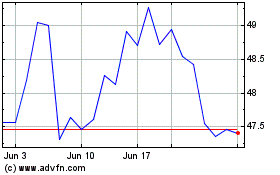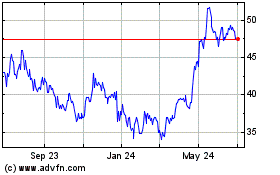Trump Signs Order Banning Alipay and Other Chinese Apps
January 05 2021 - 7:18PM
Dow Jones News
By Andrew Restuccia and John D. McKinnon
WASHINGTON -- President Trump signed an executive order banning
transactions with eight Chinese-connected apps, including the
Alipay payment platform owned by Chinese billionaire Jack Ma's Ant
Group Co.
The order also bans transactions with the WeChat Pay app owned
by Chinese tech giant Tencent Holdings Ltd., along with six other
apps.
The order, which was signed on Tuesday, takes effect in 45 days,
after Mr. Trump leaves office. It instructs Commerce Secretary
Wilbur Ross to evaluate other apps that could pose a national
security threat, and calls on the commerce secretary, the attorney
general and the director of national intelligence to issue a report
with recommendations to prevent the transfer of data from U.S.
users to foreign adversaries.
Mr. Trump, in the order, said the apps can access private
information from their users. That information could be used by the
Chinese government to "track the locations of Federal employees and
contractors, and build dossiers of personal information," Mr. Trump
said.
Alipay, a payment and lifestyle app with more than 1 billion
users, is owned by Ant Group, the Chinese financial-technology
giant controlled by Mr. Ma. An Ant representative had no immediate
comment. A WeChat representative also had no immediate comment.
The new move comes after the Trump administration issued a pair
of executive orders in August meant to impose new limits on the
Chinese social-media apps TikTok and WeChat, citing national
security concerns. Both orders have faced legal challenges.
The order banning downloads of Tencent's WeChat was blocked by a
federal judge in September shortly before it was scheduled to go
into effect.
The Trump administration has sought to overturn the ruling.
WeChat is a competitor of Alipay.
U.S. companies who do business with China raised concerns about
the potential scope of the WeChat executive order, arguing it could
make them less competitive there. U.S. businesses might raise
similar concerns about the new order.
Two federal judges also separately blocked the Trump
administration's TikTok ban from going into effect. The ban would
have restricted U.S. companies from conducting transactions with
TikTok, including hosting the company's data and delivering the
company's content, which would have essentially made the app
inoperable in the U.S.
In issuing its executive order calling on TikTok to effectively
be shut down or sold to a U.S. company, the administration said it
feared TikTok's Chinese parent company ByteDance Ltd. could share
information about U.S. users with the Chinese government, which the
company said it would never do.
The Trump administration also has sought to restrict
Chinese-based telecommunications firms such as Huawei Technologies
Co. through executive orders. Those actions were aimed at securing
U.S. networks but also appeared to undercut the Chinese firms'
competitiveness around the world when next-generation 5G wireless
service is beginning to be made available.
Write to Andrew Restuccia at Andrew.Restuccia@wsj.com and John
D. McKinnon at john.mckinnon@wsj.com
(END) Dow Jones Newswires
January 05, 2021 19:03 ET (00:03 GMT)
Copyright (c) 2021 Dow Jones & Company, Inc.
Tencent (PK) (USOTC:TCEHY)
Historical Stock Chart
From Mar 2024 to Apr 2024

Tencent (PK) (USOTC:TCEHY)
Historical Stock Chart
From Apr 2023 to Apr 2024
